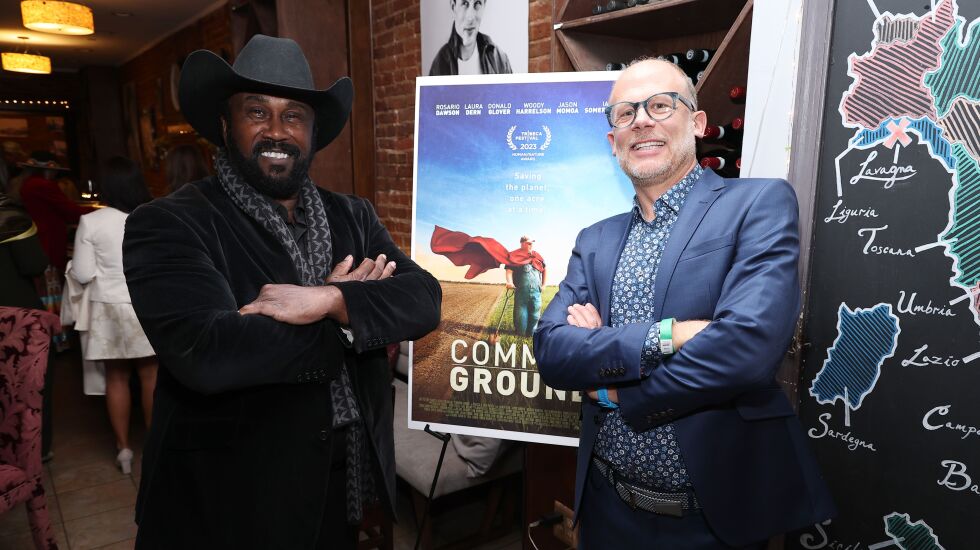
Soil. It’s where our food comes from and the foundation of all life on land.
The way human beings have traditionally farmed in the modern era devastates the soil. It impacts the quality of the food people and farmed animals eat and thus our collective health. It’s not sustainable, vastly reducing the amount of farmable land available to us and our ability to feed the planet.
There’s a solution. One that we need to consider carefully, that offers a path toward sustainability and environmental health. It’s called regenerative farming.
The recent documentary film Common Ground provides a groundbreaking look into this critically important crisis and how we can fix it.
Normally when I’m asked to watch the latest “environmental documentary,” I admit to being susceptible to that mild sense of dread we all get when we’re about to be presented with the problems of the world further solidified before our eyes.
But Common Ground is anything but bleak. To the contrary, it offers desperately needed hope at a time when environmental degradation, the climate crisis, the extinction crisis and threats to our natural resources are driving cynicism among even the most optimistic.
Common Ground explores how, as Gabe Brown, a Bismarck, North Dakota, regenerative rancher featured in the film, puts it, the current dominant system of industrial agriculture “is working to kill things,” while regenerative agriculture “works in harmony and synchrony with nature, with life.”
The status quo of industrial agriculture abuses and degrades our soil with tillage, synthetic substances, monocultures — the cultivation of just one crop in a given area — and not sequestering carbon. Regenerative agriculture, in short, doesn’t rely on these things. It relies on methods that protect the soil and offers a sustainable, healthy alternative.
Even before today’s high-tech agribusiness, industrial farming methods used by small and large farmers alike were causing devastation to our topsoil. Brown points out the Dust Bowl of the 1930s wasn’t caused by drought alone but by “copious amounts of tillage.”
Rejuvenating our soil, and climate
Common Ground uses historical examples that, as a lifelong student of history, I love. One highlight is a newly told account of the revolutionary agricultural genius, George Washington Carver (told by Leah Penniman, a farmer and author of Farming While Black).
While Carver is known in history books as “the peanut guy,” he was far more. Carver understood that to take farmers out of poverty, you had to build healthy soil. Peanuts, it turns out, put nitrogen into the soil. Using peanuts and various techniques he developed by studying nature, Carver taught an entire generation of Black farmers how to farm in harmony with nature, like the indigenous peoples of America.
Common Ground also strikes an important chord in addressing climate. Healthy soil has the potential to sequester tremendous quantities of CO2. From large farms to urban gardens, the caretaking of soil can produce more profitable and more nutritious food and help mitigate the climate crisis.
The entertainment industry, through film and television, can be a powerful catalyst for change.
“The slap heard around the world” by Sidney Poitier’s character in 1967’s In the Heat of the Night was an important symbol of the right and need to stand up for Black dignity. And how can we forget the societal impact of TV shows like All in the Family, The Jeffersons and Good Times, created by Norman Lear, my dear friend who recently passed away at 101.
Common Ground’s celebrity narrators open the film by passing on reflections in the form of a letter to current and future generations. Woody Harrelson mentions that what viewers are about to receive are “hard truths.” I couldn’t help but think of Al Gore’s An Inconvenient Truth, which was instrumental in sounding the alarm and raising global awareness about climate change.
The impact of An Inconvenient Truth got an important cultural boost when the film won the Academy Award for Best Documentary Feature of 2006. It would benefit all of us for Common Ground to gain similar recognition.
To borrow a phrase from Harrelson, “the one thing that’s keeping us all alive is that soil you’re standing on.” Let’s get hopeful again about environmental solutions. Let’s work to find our common ground.
Ben Jealous is executive director of the Sierra Club and a professor at the University of Pennsylvania.
Send letters to letters@suntimes.com







